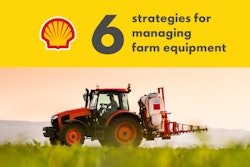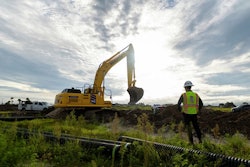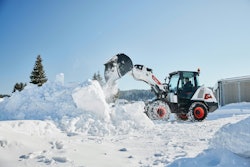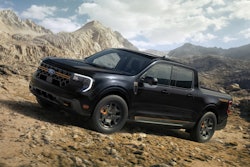When the job calls for getting rid of trees and vegetation, which machine gets it done faster and more economically, brush chippers or self-propelled forestry mowers?
To help answer this question we talked to Kevin Covert, sales and marketing manager for Rayco Manufacturing, which makes both types of machine. Each has unique strengths and the choice usually depends on the type of job you’re doing or the type of contractor you are. But the right choice is not always a given.
Note that the names for these two types vary: forestry mowers are sometimes referred to as brush cutters and chippers are sometimes called brush chippers. To avoid confusion we’ll refer to the tow-behind machines that you feed logs and limbs into as chippers and the self-propelled machines that push down and grind up material on the ground as forestry mowers.
Residential environments
Lightweight chippers can be towed across lawns or practically anywhere with minimal impact. Their small size makes maneuvering around buildings, fences and other structures easier. Many models have multi-directional chip chutes that direct the flow of processed chips to a truck or a stockpile where they can be more easily loaded.
Advantage: Chippers
Undeveloped land
If you’re pioneering forested land, the forestry mower works at a much faster pace, knocking down and mulching tress or brush up to 6 inches in diameter. Tracked forestry mowers will also traverse steep hillsides and uneven terrain where staging a chipper would prove unsafe or unstable. (There are tracked chippers on the market, which can be put into rough terrain applications, but these are somewhat rare compared to wheeled tow-behind models.)
Advantage: Forestry mower
Labor and crew size
A forestry mower is a one-man machine. With a chipper you typically field a tree service crew, which includes the climber to delimb the trees, then two or three people to bring the material to the machine, Covert says. So your labor costs for a chipper are three to four times as much per hour as a forestry mower.
Advantage: Forestry mower
Portability
Most chippers capable of handling material up to 12 inches in capacity can be towed by a 1/2-ton pickup, Covert says. As machine sizes increase you may need to step up to a 3/4 ton or 1 ton. But with their torsion flex axles, chippers are easily and inexpensively moved from site to site. Forestry mowers require a dedicated trailer. The smallest model made by Rayco, the C87FM, weighs 12,000 pounds. The largest, the Hydra Stumper, weighs 28,000 pounds and requires a semi-truck and wide load permits to tow.
Advantage: Chippers
Handling stumps
Most residential customers want tree stumps ground down to at least 6 inches below the surface. In land clearing if earthmoving equipment is to follow the stumps will have to be removed entirely. Chippers won’t grind stumps. Forestry mowers can grind small diameter stumps, but only to a depth of 2 to 3 inches, Covert says. So with either machine a stump grinder or stump removal via excavator or dozer is required. One exception for forestry mowers: in jobs clearing pipeline and utility right of ways stump removal more than 2 or 3 inches below the surface is usually not required.
Advantage: Tie, except in brush control/right-of-way mowing in which case a forestry mower wins.
End product
In the past five or six years tree clearing services have started collecting and selling their end-product wood chips as landscape mulch, making a little bit of money off what used to cost money to throw away, Covert says. The chips are run through a second grinder, screened to a specific size and sometimes dyed brown or black for a uniform appearance. And unlike red-dyed mulch, which is typically just ground up pallet wood, tree chip mulch contains valuable moisture and nutrients that contribute to soil health.
Forestry mowers stir their end product into the soil, and while these wood chips can’t be recovered for sale, they do have some value. By adding moisture to the soil this type of mulch can help prevent or dampen forest fires – a characteristic that’s becoming desirable out west and even sometimes written into job specs.
Advantage: Chippers can make you a little extra money, but the well-mulched soil left behind by forestry mowers can be a selling point for certain customers.
Material capacity
Commercial quality chippers are rated according to the diameter of the material you can run through them, with a typical range from 12 inches to 20 inches. Forestry mowers process much smaller material, 4 to 6 inches in diameter. Keep in mind, however, that many land clearing contractors will sell standing timber on a site, rather than chip it and add a little money to the bottom line in doing so.
Advantage: Chippers
Speed
All other things being equal if you have a 10 or 20 acres of undeveloped land to clear, a forestry mower can do the job in much less time than if you were to fell the trees and bring them to a chipper.
Advantage: Forestry mower
Verdict
As a general rule chippers are used by tree service crews in residential areas. Mowers take the larger land clearing jobs in undeveloped areas or right-of-way maintenance. When you want to “make the woods disappear,” as Covert says, the mower is the way to go. There are a lot of jobs where forestry mower operators spend all day in the cab, flattening a large number of acres.
But there is some crossover and opportunities for tree service companies to consider mowers and vice versa. “Sometimes they’ll want to complement their tree service business and do some small land clearing instead of just residential work,” Covert says. And while residential tree work is often priced by the hour, land clearing crews can get good margins and $3,000 to $4,500 an acre for mower applications.
Land clearing contractors may also benefit from having a chipper available, especially when they encounter trees that are too large to knock down but too small to sell as saw logs. In that case a chipper can turn small logs into sellable mulch. In some applications it’s common for the mower to clear all the brush from around the big trees to make it safer and easier for crews to get in and fell the trees for a chipper, or to sell as saw logs, Covert says.









